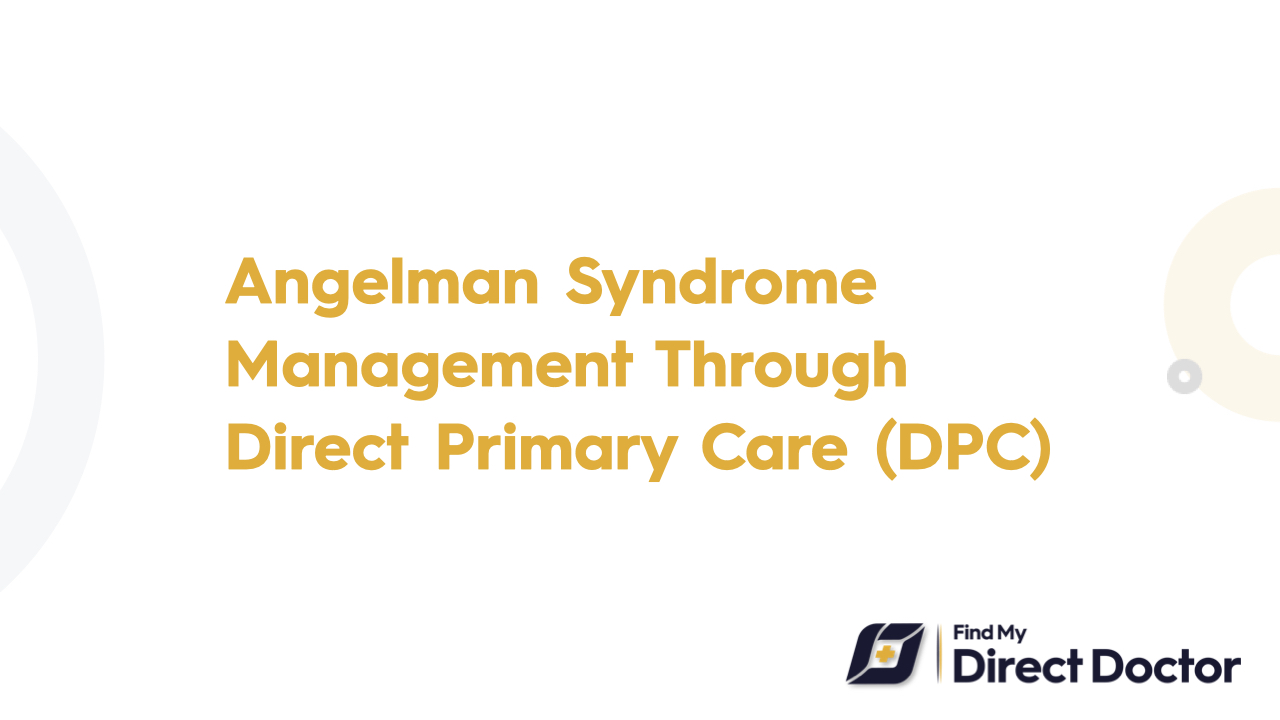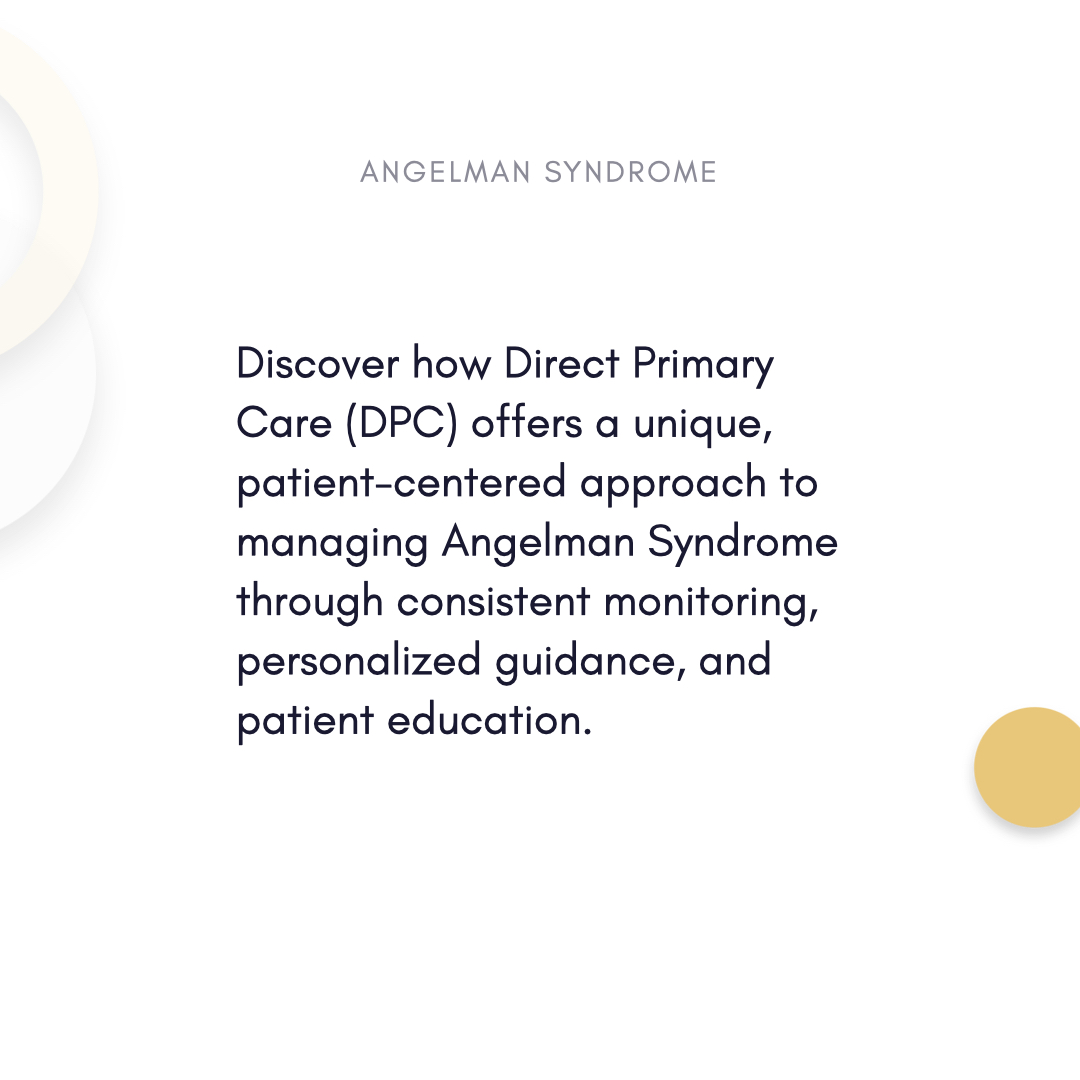Angelman Syndrome and Direct Primary Care (DPC): Compassionate, Coordinated Care for Complex Needs
Rare neurogenetic disease Angelman Syndrome (AS), brought on by a loss of function in the UBE3A gene, causes severe developmental delays, speech difficulties, seizures, motor challenges, and a distinct behavioral profile distinguished by a happy demeanor. To meet psychological, physical, and cognitive needs, managing AS calls for lifetime multidisciplinary treatment. With a patient-centered approach that gives accessibility, continuity, and customized strategies top priority, Direct Primary Care (DPC) helps patients and families better their quality of life.

Knowing Angelman Syndrome: Important Difficulties
- Inner Symptoms:
- Extreme silence or speech disability.
- Developmental delays concerning motor skills, cognitive ability.
- Ataxia, tremors: movement disorders.
- Seizures (80–90% of cases), disturbed sleep, hyperactivity.
- Causes: Either maternally inherited genetic mutations or deletions on chromosome 15.
- Complications: Anxiety, reflux, constipation, scoliosis, and poor communication.
How DPC Improves Management of Angelman Syndrome
A membership model (USD 100–USD 200/month), Direct Primary Care (DPC) gives unrestricted access to a primary care physician. This translates for AS families as:
- No waiting for GI discomfort or seizure clusters—urgent concerns.
- Clear pricing—discounted treatments, specialist referrals, genetic counseling.
- Medical, developmental, and behavioral support combined in holistic treatment.
1. Harmonized Multidisciplinary Treatment
- Working in neurology: Under EEG monitoring, control seizures with anti-epileptic medications (AEDs) such as valproic acid or clonazepam.
- Referrals for physical, occupational, and speech therapies at agreed-upon pay rates.
- Gastroenterology support: Using dietary plans or drugs (e.g., PPIs, laxatives), treat reflux/constipation.
2. Tailored Symptom Management
- Using Angelman Syndrome Foundation recommendations, DPC combines:
- Seizure control: Change prescriptions depending on caregiver feedback and EEG findings.
- Melatonin or behavioral techniques for control of circadian rhythm provide help with sleep.
- Applied behavior analysis (ABA) can help with anxiety or hyperactivity.
3. Family-Centered Assistance
- Train caregivers in behavior management, communication tools (AAC devices), and seizure response.
- Affordable referrals to home health aides or special needs programs help with respite care coordination.
- Tools for mental health: Counseling for siblings or parents handling stress.
DPC: Benefits for Angelman Syndrome Patients
- Accessibility and Continuity of Care:
- Same-day appointments for pressing concerns (such as feeding problems or seizure clusters).
- 24/7 telehealth support to help caregivers through crises.
- Individualized, Patient-Centered Therapy:
- Create customized plans for behavioral changes and developmental benchmarks.
- Work with educational institutions according to IEP/504 plans.
- Less Administrative Load:
- More time for patient care and coordination of care comes from no insurance billing.
- Reasonably priced genetic testing (UBE3A panels for USD 300–USD 500 against USD 1,500+).
DPC Personalized Angelman Syndrome Management
The Angelman Syndrome Foundation stresses personalized treatment. DPC presents this through:
1. Thorough Coordination of Care
- Early intervention: Referrals for motor skill development to physical/occupational therapists.
- Working with speech therapists: Help introduce AAC devices or sign language.
- Coordinate a ketogenic diet by working with dietitians for strategies for lowering seizures.
2. Whole Approach
- Counseling and community resources help address family stress and anxiety.
- Track benchmarks and modify treatments to best maximize development.
3. Preventive Complication Active Approach
- Scoliosis screening calls for frequent physical exams and orthopedic referrals.
- GI health: Control reflux or constipation to avoid aspiration hazards.
Real-Life Success Stories
- Case 1: Lucas, 7, ate a ketogenic diet and DPC-coordinated neurology treatment to cut his 60% frequency of seizures.
- Case 2: Through DPC's discounted therapy network, Sophie's family saved USD 8,000 annually on speech/OT visits.
FAQs on Angelman Syndrome and DPC
- Q: Is DPC able to write anticonvulsants?
A: Certainly! DPC specialists coordinate neurology follow-ups and control AEDs.
- Q: In what ways does DPC support school accommodations?
A: Advocates for customized support, writes letters and shows up for IEP meetings.
- Q: Are sibling genetic tests covered?
A: DPC negotiates (USD 300–USD 500 per test) self-pay rates for UBE3A testing.
Why DPC Is a Revolution for Angelman Syndrome
- Attention to Details: Helps to simplify complexity: One doctor schedules schools, therapists, and neurologists.
- Empowers Households: Training in behavioral strategies, AAC devices, and seizure action plans.
- Enhances Results: Frequent monitoring helps avoid crises such as aspiration pneumonia or status epilepticus.
How DPC Specifically Improves AS Management
DPC follows guidelines published by the Angelman Syndrome Foundation by:
- Giving early intervention top priority: Referrals for timely therapy help maximize development.
- Improving communications: Connect schools, experts, and families.
- Encouraging confidence: Good patient-physician relationships increase treatment compliance and satisfaction.
Using DPC, Confidently Negotiate Angelman Syndrome
Angelman Syndrome offers lifetime difficulties, but with DPC, families find a partner committed to customized, reasonably priced treatment. From developmental support to seizure management, DPC guarantees compassionate and knowledgeable meeting of every need.






